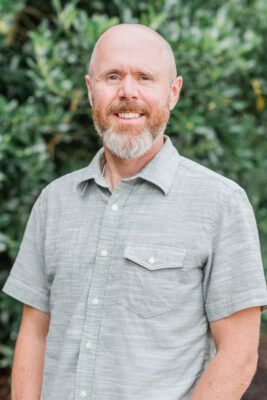PhD Alum Scott Sikes’ Earns 2022 CCI Outstanding Dissertation Award

At the core of Scott Sikes’ work, both research and professional, is observing and analyzing what people can do when they work together to make their communities and the world a better place. His dissertation, In Our Very Blood: The Use of Social media in the 2018 West Virginia Teachers Strike, follows that same thread. It was awarded the 2022 College of Communication and Information Outstanding Dissertation Award.
“My dissertation was ostensibly about the labor movement, the use of information, and an event of collective action around a labor strike. It’s about the larger questions of how we live in the world and are members of the community together, and that’s the overarching theme of this undergraduate program I’m involved in,” said Sikes, referring to the Appalachian Center for Civic Life program at Emory & Henry College, of which he is now the director. “It’s very interdisciplinary and asks students to tap into their own knowledge and experiences in the world, and think about how we can all be better citizens, and the dissertation asked those kind of questions, too.”
The dissertation is available through the University of Tennessee, Knoxville’s Tennessee Research and Creative Exchange (TRACE) site, and can be downloaded here. Sikes is also contracted to take his dissertation and turn it into a book, which will take a more interdisciplinary view by including historical and sociological aspects of the West Virginia Teachers Strike. He said he wouldn’t have been able to accomplish what he did without the assistance of his doctoral committee as well as CCI staff members who support the PhD program.
“Certainly I want to thank the members of my committee who were so utterly invaluable, but also everybody there in CCI, particularly Margaret Taylor. All of those folks who just kind of do that hard day-to-day work in keeping things going, they helped me so much and were equally valuable and important to me and I’m just deeply appreciative of everybody there,” he said.
While he will be broadening aspects of his research, both for the book and as he pursues research as tenured faculty, Sikes said one of the reasons he chose the doctoral program at CCI is because it was interdisciplinary and didn’t narrow his options to solely information sciences.
“One of the great things about CCI is that, all through that program, I was able to take classes and have conversations with people in all of those disciplines and programs and it was just so helpful to me to encounter different perspectives in terms of theory and research,” he said. “In encountering all those people, I know the quality of work of my colleagues, and to think mine is being recognized amongst all that work—I’m very proud of that and humbled by it, too.”
Sikes was already an instructor at Emory & Henry College before he defended his dissertation, but once his doctoral program was complete, he officially moved into the role as a tenure-track assistant professor and director of the Appalachian Center for Civic Life. This, he said, is a perfect pairing for many reasons: he is an undergraduate alumnus of the college and participated in the program at the center, and he greatly appreciates and deploys interdisciplinary approaches and the center, which is also how many of the center’s programs are structured. The center promotes community organization and leadership, so it isn’t difficult to see the impact it made on Sikes as he moved forward in his academic career and research.
Sikes said he feels the importance of his dissertation and research work is not just in its specific context of how information technology is used for collective efforts, but also in pushing the boundaries of information sciences. The interdisciplinary nature of CCI’s doctoral program helped him to see that sometimes limitations are put on information sciences, and he hopes graduate students continue to push like he did, both in their research and in the professional field.
“If anything is central to our social world it is information. It’s central to who we are as human beings and how we exist in the world. It can be far more multi-disciplinary and be more creative in terms of the ways it examines the use of information in our social world,” he said.